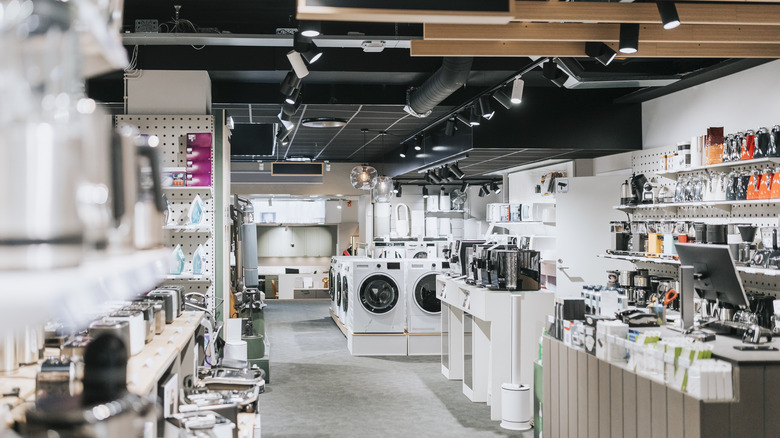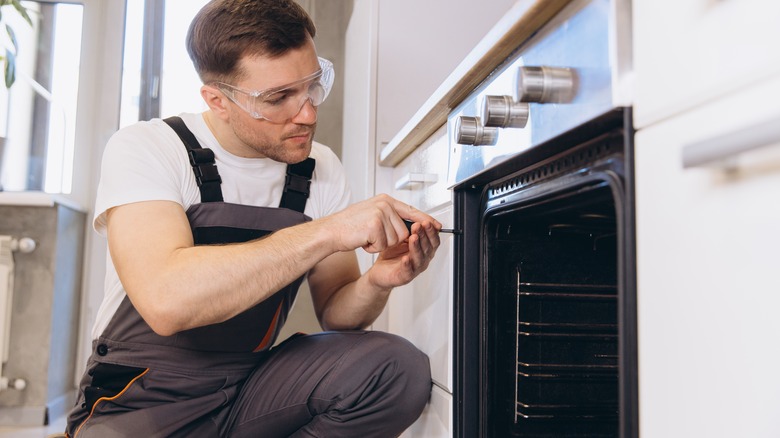The Kitchen Appliance Brands That Are Prone To The Most Breakdowns
Big appliances are big investments. Nobody wants to drop $1000 on a shoddy stove, though, so careful consideration is key. But, as licensed appliance expert Dennis Godynuk explains, when and where you buy your appliance can be just as important as the brand.
Godynuk, who works at Comfort Appliance Repair in Nashville, Tennessee, says it's less about the brand and more about buying the wrong model at the wrong time. He says you get what you pay for — even if you think you're getting a good deal. Some brands roll out lower-quality items around major shopping holidays like Black Friday, and these appliances are prone to breaking. "In my experience, the most repeat calls are for budget 'special' models sold during big sales," he tells The Takeout. That said, there are brands to avoid. We've covered why shoppers should stay clear of Haier, and Godynuk also warns against some models of Samsung and LG refrigerators.
But it's not just Samsung and LG: Godynuk says that fridges tend to break down fast, anyway. "Refrigerators and dishwashers lead my kitchen calls," he says. The machines get a lot of wear and tear, and there's a lot that can go wrong. "Fridges have compressors, fans, boards, and ice systems that all run daily," he explains. "Dishwashers take heat, hard water, and food soil. Cheap pumps and heaters fail early." But what appliance brands should you buy? And how can you prevent breakdowns in the first place?
What appliance brands should you buy?
There's no one brand that Godynuk recommends for everything: Each one has its specialties. "For dishwashers, Bosch has been steady for my customers," he says. "For ranges, a basic GE or Whirlpool unit with knobs is easy to live with and easy to fix. For fridges, pick a model with strong parts access and good service locally, not just a pretty screen."
If you want an appliance that'll last, do your homework before making the purchase. Don't immediately go for the brand with the longest list of five-star reviews, either. Even the best appliances break, and those glowing reviews and fancy certifications won't mean much if you can't find someone to service your stove. Make sure the brand and model are supported by local repair shops — and ask around before you buy the machine, not after. Ideally, opt for an appliance supported by multiple shops in your area. You'll want backup if your regular repair place goes out of business or can't service your machine in time.
Godynuk says you should check to see if your machine has readily available parts, too. He explains that parts should be easy to obtain, priced at a fair rate, and used by many different models within a brand's line of appliances. It's not just about convenience — it's also a sign of quality. "Brands that invest in parts ... usually build simpler, tougher machines," he states. "Fewer guesswork repairs, fewer repeat failures."
What can you do to prevent appliance breakdowns?
According to Godynuk, many appliances start to wear out after just a few years. "Light-duty models can start acting up in 3 to 5 years, often fans, valves, or control boards," he says. The most common problems? "Poor ventilation, long runs on a bad extension cord, hard water scale, and clogged coils," notes Godynuk.
So what can you do to make your budget model last (or make sure you get the most out of your high-end investment)? Treat your machine right and be proactive about repairs. Godynuk explains that, as much as we'd all like to blame the manufacturer, customers bear some responsibility. Properly cleaning your appliances and staying on top of problems as they arise will help extend the life of the machine. Godynuk also says that maintenance starts with installation. Improper installation can cause leaks, wiring issues, and voided warranties, so consider hiring a pro to make sure your appliance lasts as long as possible. "Good install and regular cleaning push that timeline way out," he shares.
Godynuk adds that repairing malfunctions can help to prevent a pileup of future issues. "If a $25 inlet valve is in stock, we replace it this week before it leaks onto a board or bearings," he says. It's just one more reason why the best appliance for you is one with plenty of local support — not necessarily the one the internet recommends.


